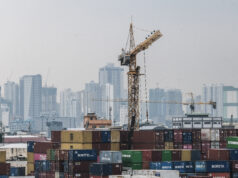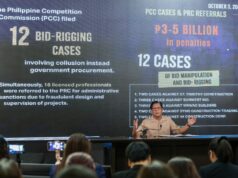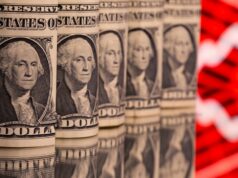Duterte pushes reforms, rails vs graft
By Norman P. Aquino
Associate Editor
PRESIDENT Rodrigo R. Duterte on Monday asked lawmakers to pass more tax reforms starting with a proposal to cut corporate income tax, overhaul fiscal incentives given out to companies and further increase tobacco and alcohol excise tax rates.
In his yearly state of the nation address to Congress halfway through his six-year term, Mr. Duterte also asked Congress to restore the death penalty for drug trafficking, plunder and other heinous crimes, while promising to defend Philippine rights in the South China Sea “in a peaceful way.”
“It inspires me with determination to pursue relentlessly what we have started at the start of my administration,” the president said in a speech that started an hour late and lasted about one-and-a-half hours.
“Believe me, I will end my term fighting.”
Mr. Duterte, 74, started his address bragging about his sky-high approval ratings, even as he admitted that government corruption continues and the illegal drug menace persists.
Mr. Duterte, the first Filipino president from Mindanao, marks his midterm with an 85% approval rating, according to Pulse Asia Research, Inc. despite what his critics regard as a head-in-the-sand response to Chinese aggression in the South China Sea.
He said further tax reforms would energize micro, small and medium enterprises to expand their businesses that would hopefully generate more jobs in the coming years.
Unexpectedly absent from the president’s speech is his earlier call for lawmakers to relax economic provisions of a three-decade-old constitution, as well as his previous push for a shift to a federal government system so growth will spread outside Manila, the capital.
Instead, Duterte zeroed in, aside from illegal drugs, on the territorial dispute with China and persistent government corruption.
He later told reporters it wasn’t the proper time to talk about constitutional amendments.
“The West Philippine Sea is ours, there’s no ifs and buts, it is ours,” the tough-talking leader said in his address, referring to the South China Sea, more than 80% of which China claims.
“But we have to temper it with the times and the realities we face today,” he added, noting an armed conflict with China would only bring “grief and misery.”
Mr. Duterte blamed Benigno S.C. Aquino III, his predecessor, for allegedly giving way to China after a 2012 standoff in Scarborough Shoal that later allowed the regional power to occupy the shoal.
“The president struggles to make sure that he will not be a lame duck president in the remaining three years of his term,” Marlon M. Villarin, a political science professor from the University of Santo Tomas, said by telephone. He added that having a super-majority in Congress “gives Mr. Duterte a political assurance that his programs and activities will be delivered.”
Mr. Villarin noted that the president thinks that the only way to resolve the sea dispute with China is through diplomatic means. “But what is unprecedented is when he blamed his predecessor about the Scarborough Shoal. It is so not like him.”
‘NO SACRED COW’
In his speech, the president said the recent uncovering of massive fraud perpetrated against the public health insurance system proves that corruption is pervasive. “Huge amounts of medical funds were released to cover padded medical claims and imaginary treatment of ghost patients. I am grossly disappointed,” he said.
At the same time, Mr. Duterte claimed to have fired and caused the resignation of more than a hundred officials and appointees of government “without regard to relationship, friendship and alliance.”
“There is no sacred cow, as the saying goes, in my administration.”
The president likewise vowed to pave the way for the removal of corrupt officials at the Bureau of Customs, where more than 60 people are under investigation for corruption.
“That is one area where we need more focus,” Philippine Chamber of Commerce and Industry Chairman George T. Barcelon, said by telephone, referring to Mr. Duterte’s call on the Land Transportation Office, Social Security System, Bureau of Internal Revenue and Bureau of Customs to shape up.
“The president should also have mentioned about the needed investment in training workers given the job-skill mismatch.”
“The European Chamber of Commerce of the Philippines (ECCP) urges the government to further improve the efficiency of tax collection and address leakages,” ECCP Executive Director Florian Gottein said in an e-mailed response to questions.
“On top of the list is the TRABAHO (Tax Reform for Attracting Better and High-Quality Opportunities) bill where the ECCP urges the government to start reducing the corporate income tax rate as quickly as possible.”
The chamber wants to government to lower the tax to 25% at the onset and an annual 1 point cut until the proposed 20% tax rate is reached.
“We also urge the government to come up with a competitive fiscal regime as quickly as possible to dispel any uncertainties,” Mr. Gottein said.
Under Mr. Duterte’s leadership, Congress cut personal income taxes and increased levies on some goods and services. Lawmakers also replaced quantitative restrictions on rice with tariffs to bring down prices, as well as passed a measure easing business processes in the country.
A continuing reform thrust, despite political noise, convinced S&P Global Ratings to lift the Philippines’ debt score to “BBB+” — a historic high for the country — with a “stable” outlook from “BBB,” two notches above minimum investment grade and a step away from an “A” rating.
Mr. Duterte asked legislators to approve a Salary Standardization Law that will benefit underpaid public teachers, and a National Land Use Act that will help local governments craft development plans as foreign investors start coming in. This will help disperse economic activities to the countryside, particularly the Visayas and Mindanao, he said.
The president likewise sought the approval of a bill that will streamline the bureaucracy, and vowed to pave the way for the use of coconut levy funds for farmers.
The economy has grown about 6.5% in the past two years compared with 6.3% in the six years through 2016, and Mr. Duterte’s original target of 7-8% until 2022.
Inflation has been easing back this year into the central bank’s 2-4% target after successive multi-year monthly peaks that averaged a nine-year-high of 5.2% last year. — with Arjay L. Balinbin



